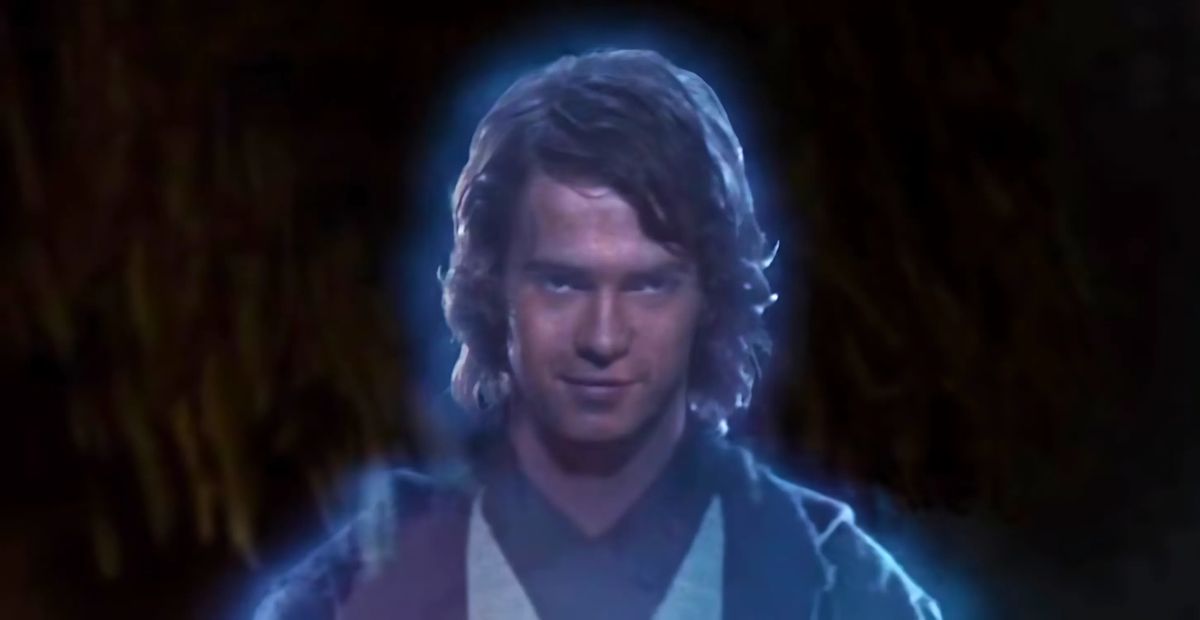The first time we see Anakin Skywalker as a Force ghost is at the end of Return of the Jedi, after he redeems himself and helps his son Luke defeat the Emperor. The Chosen One finally becomes one with the Force, joining his former Master Obi-Wan Kenobi and Yoda on the Forest Moon of Endor.
But did you know that the moment Luke sees those three Jedi spirits carries even deeper meaning? According to Star Wars lore, Anakin actually speaks with Obi-Wan in the Force, reflecting on his past mistakes and what he’s become.
Here’s how that story plays out.
Anakin’s First Interaction With Obi-Wan after His Death
So let’s rewind a little bit here, to the scene we’re all familiar with—when Luke is carrying Anakin and trying to escape the Death Star II. Anakin, already dying, asks Luke to remove his helmet so he can see his son for the last time.
As Anakin takes his final breath and slowly lies down to die in front of Luke, something happens. In that quiet moment as he closes his eyes, Anakin hears voices from his past—his mother’s voice, Padmé, Qui-Gon, and even Ahsoka. But then, suddenly, he hears a voice he hasn’t heard in a very long time: the voice of his old Jedi Master, Obi-Wan Kenobi.
Thanks to the canon novel Star Wars: From a Certain Point of View: Return of the Jedi | “Brotherhood”, we actually get to hear the exact words Anakin remembers as he slips into death.
“He didn’t just see, He heard. He felt.
‘I know there’s good in him.’ His wife
‘He is the Chosen One. Train him.’ His first master.
‘I know Anakin. Your vision is flawed.’ His padawan.
‘He was the best star pilot in the galaxy, and a cunning warrior. And he was a good friend.’”
But it was Obi-Wan’s words that stirred something deep in Anakin—because ‘friend’ was a word he hadn’t heard in a long time, not since he became Darth Vader.
The voice kept calling “Anakin… Anakin,” and finally Anakin recognized whose voice that was. He replied, “Obi-Wan.”
Anakin Confessed to Obi-Wan
After responding to Obi-Wan, Anakin heard his old Master say,
“Still trying to be the hero. There’s no holonet here to make you a poster boy.”
It’s a line laced with familiarity—half teasing, half truth. Obi-Wan wasn’t just mocking Anakin’s tendency to chase glory; he was reminding him of who he used to be. The young Jedi who fought to be seen, to be praised, to live up to the expectations placed on the Chosen One. In death, there were no crowds, no reputation to maintain—just the truth.
And Anakin faced it head-on.
“I’m not a hero, I have done such terrible things. I have caused suffering across all corners of the galaxy. I have failed you. Taken from you—taken from the galaxy, from the Jedi.”
This wasn’t Darth Vader speaking anymore. These words came from the broken man beneath the mask—Anakin Skywalker, filled with guilt and regret. He wasn’t trying to justify his actions or hide behind excuses. For the first time in years, he was taking responsibility, admitting the weight of his choices and the pain he caused.
“But I made those choices. To kneel to the dark side. To storm the Temple. To fight you.”
Each phrase is like a dagger, naming the sins that haunted him. These weren’t just crimes of war—they were betrayals of everything he once believed in, including the man standing before him. This wasn’t a confession for forgiveness—it was Anakin holding up the truth, raw and unfiltered.
But Obi-Wan wasn’t here to condemn him.
“You did. Those belong to you,” Obi-Wan said, not with bitterness, but calm acceptance.
“But so does something else. One moment that led to immense consequences. Anakin. I have asked you many times to be patient. And listen.”
Obi-Wan then continued: “When he called you out, you answered. You chose him over the Emperor. You chose empathy over power. You chose a future for the galaxy, to break the rule of the Sith. You chose to bring balance.”
Every word lands with quiet clarity. Obi-Wan wasn’t just praising what Anakin had done; he was reminding him that, in the end, he fulfilled his destiny as the Chosen One. It wasn’t prophecy or power that redeemed him. It was love. Compassion. A decision to protect his son instead of continuing a legacy of fear. For all his past failures, Anakin had made the one choice that mattered most.
He didn’t die as Darth Vader. He died as Anakin Skywalker. And in that final act, he didn’t just save Luke—he saved himself.

